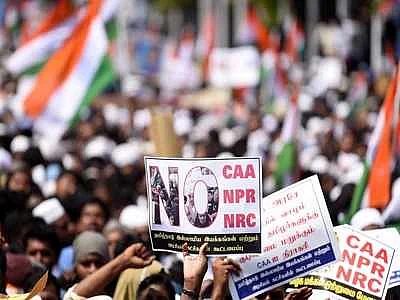Reclaiming the Republic: Constitution by itself no guarantee against fascism or genocide
Provisions for Right to Life, Equality, Freedom of Religion and Right to Protest etc. in the Constitution are no guarantee against fascism, unless people fight for justice, writes Mihir Desai

Recent years have witnessed multiple stabs on the Indian Constitution. A Constitution is ultimately a syncretic interaction between what it says on paper, how it acts out in practice and how it is interpreted.
Four major Constitutional amendments have been introduced during the Modi regime- the first concerning appointment to higher judiciary which was struck down by the Supreme Court, the second concerning GST (Goods and Services Tax), the third was the virtual repeal of Article 370 of the Constitution concerning Kashmir which is under challenge in the Supreme Court and the last was introduction of 10% reservation for economically backward classes which again is under challenge in the Supreme Court.
Besides these, the present establishment has not made any changes to fundamental rights or directive principles of the Constitution; nor have they amended Constitutional provisions concerning citizenship, legislative bodies, various institutions of accountability such as Finance Commission, Comptroller and Auditor General of India (CAG), provisions concerning internal emergency, rights of tribals or scheduled tribes, etc.
By the semantics of the Constitution, India continues to be a secular state, with right to equality and non-discrimination, freedom of religion, right to life, vibrant parliamentary democracy, guaranteed protection of minorities, citizenship by birth etc.
But in reality, what we have seen during the last seven years is a complete inversion of all this. The Citizenship Amendment Act (CAA) which makes citizenship conditional on religion, complete absence of a vibrant parliament, hate speeches and lynchings being legitimised, complete hollowing out of independence of bodies such as the Election Commission, CAG, various accountability tribunals and extremely hesitant if not genuflecting approach of the higher judiciary. I strongly believe that a march towards Hindu Rashtra is possible without necessarily tempering with the wording of the Constitution.
Obviously without a strong Constitution a vibrant sustained democracy is not possible. At the same time the Constitution by itself is no guarantee against authoritarian practices or even against a genocide.
While celebrating the progressive values of the Constitution, we need to also realise that despite our Constitution, communal and caste violence happened even during post-Constitutional and pre-Modi regimes, whether in Ahmedabad 1969, Nellie 1983, Delhi 1984, Mumbai 1992, Gujarat 2002 or Kandhamal 2008. Hardly anyone was prosecuted and even fewer were convicted.

Similar has been the fate of many cases of violence against Dalits, women and tribals. Thus, progressive Constitution by itself is no guarantee against unaccounted sectarian violence, nor is it a guarantee for justice to the victims. If any proof is required, one needs to only remember the Babri Masjid demolition of 1991 and the recent Ayodhya Judgment of the Supreme Court.
At the same time, the Constitution is the foundational document of any country and provides the parameters within which the State can operate, mechanisms of state accountability, rights of citizens vis a vis the State, the rights of minorities, etc. From this perspective, the Constitution determines the path to be travelled by a nation.
The use of draconian laws such as UAPA and sedition against the civil society and total misuse of agencies such as National Investigation Agency, CBI, Enforcement Directorate, Income Tax Authorities against political and other opponents is again an attack on the democratic moorings of the Constitution.
The lack of any provision of equality, non- discrimination, right to life, freedom of religion, right to protest, freedom of speech would provide for a free mandate for a new fascist state but as we are seeing now, the presence of these provisions in the Constitution is no guarantee against fascism.
Constitutions are not frozen in time and are always works in progress and just like any piece of legislation, even Constitutions cannot account for all eventualities. Constitutions are always expressed through words and sentences whose meaning can change depending on who is providing the meaning to it.
Justice Krishna Iyer once famously said that it is the job of the Constitutional Courts to breathe soul into the fossilised words of a law and this equally applies to the Constitution.
The Constitution acquires its meaning from four different sources: Legislature, Executive, Judiciary and the citizenry. It is here that the present problems need to be situated.
Legislature can scar the Constitution in two ways. One by emancipating the Parliament and second by passing legislations which are contrary at least to the spirit of the Constitution. The present regime has achieved quite a lot on both these aspects.
Legislature can scar the Constitution in two ways. One by emancipating the Parliament and second by passing legislations which are contrary at least to the spirit of the Constitution. The present regime has achieved quite a lot on both these aspects.
To begin with, Parliament has ceased to be a platform where vibrant debates take place. The interpretation given to the term leader of opposition has done away with any structural rights for the opposition. Similarly, passing Bills such as Aadhaar Bill as money bill thus does away with the need of Rajya Sabha. Additionally passing laws which are totally contrary to the Constitutional mandate such as the four farm laws, the labour codes, amendments to the FCRA Act, etc. not just disfigure the Constitutional spirit but directly affect the livelihood and conditions of millions of people.

The executive dismembers the Constitutional spirit by hollowing out the Comptroller and Auditor General of India, Election Commission and various other Commissions meant as an oversight over the executive. In addition, the full-fledged ‘saffronisation’ of education, history being replaced by myth and total disregard of and encouragement of hate speech, lynching and stigmatisation of religious and other minorities goes completely against the Constitutional mandate of secularism, equality, non-discrimination and freedom of religion.
The use of draconian laws such as UAPA and sedition against the civil society and total misuse of agencies such as National Investigation Agency, CBI, Enforcement Directorate, Income Tax Authorities against political and other opponents is again an attack on the democratic moorings of the Constitution. Additionally, the present legislature and executive are attacking one of the most central aspects of our Constitution, namely federalism.
Under the Constitutional scheme it is ultimately left to the judiciary to interpret the Constitution and even strike down legislation which may be in violation of the Constitution. However, in recent years the role of judiciary has come under critical scanner because of its failure to effectively deal with unconstitutional measures of the legislature and the executive as also failure to deal with its own internal problems.
Some of the most significant Constitutional challenges which should have been heard and decided promptly are the challenge to CAA, the repeal of Article 370 of the Constitution, the amendment to FCRA provisions, the challenge to PM-CARES fund, etc. Each of these deal with significant aspects of the Constitution and the direction which our country is taking.
Some of the most significant Constitutional challenges which should have been heard and decided promptly such as the challenge to CAA, the repeal of Article 370 of the Constitution, the amendment to FCRA provisions, the challenge to PM-CARES fund, etc. have been put on the back burner to the extent that many of these cases may become infructuous by the time they are heard.
Each of these deal with significant aspects of the Constitution and the direction which our country is taking. Even many other important cases which have Constitutional significance are being dealt with in a manner which signifies abdication of Supreme Court towards Constitutional principles. Ayodhya is a glaring example.
But even the manner in which Hadia’s case was handled or the review application in Sabarimala, the extreme reluctance to make the central government answerable during Covid times, the total hesitancy in dealing with Pegasus snooping case, the failure to take suo motu action against the ‘Dharma Sansad’ which gave genocidal calls, the anti-people interpretation of the Land Acquisition law, the conservative and unconstitutional interpretation of UAPA are but a few examples of the way the judiciary has allowed the present government to proceed boldly towards its aim of imposing a neo-fascist, authoritarian Hindu Rashtra.
Finally, upholding the spirit of the Constitution lies in the hands of the people. There is a strong majoritarian trend developing within a large section of the population reflected in the growing communal and casteist tendencies and actions such as hostility to inter-religious marriages, certain food habits, the attacks on places of namaaz, increasing discrimination against Dalits.
At the same time India has a vibrant civil society and has been witness to strong protests against anti-Constitutional measures. If the anti CAA/NRC protests and the antifarm bills protests are anything to go by, this is no time for despondency.
If the last 70 years of the working of the Indian Constitution teaches us one lesson, it is that people do not easily allow the Constitution both in its letter and spirit to be disregarded. However, for this it is extremely important both for the political opposition and the civil society to wage a consistent struggle which foregrounds the true spirit of Constitution in terms of equality, liberty, fraternity, democracy, secularism and federalism.
(The writer is a senior advocate practising human rights law based in Mumbai and is national vice president of Peoples Union of Civil Liberties. Views expressed are personal)
(This article was first published in National Herald on Sunday)
Follow us on: Facebook, Twitter, Google News, Instagram
Join our official telegram channel (@nationalherald) and stay updated with the latest headlines